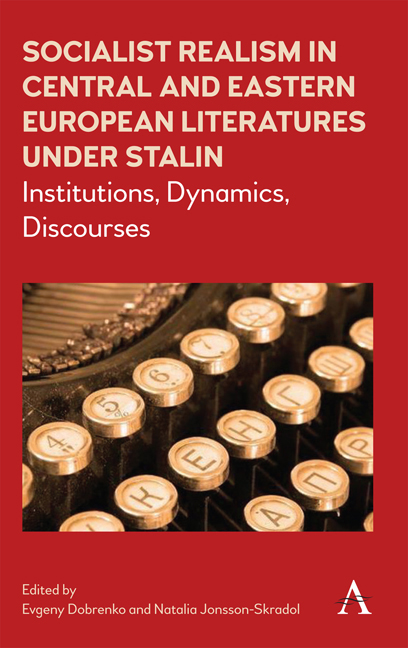 Socialist Realism in Central and Eastern European Literatures under Stalin
Socialist Realism in Central and Eastern European Literatures under Stalin Book contents
- Frontmatter
- Contents
- Acknowledgements
- Introduction
- Part 1 Institutions
- 1 How Socialist Realism Was Exported to Eastern European Countries and How They Got Rid of It
- 2 Literary Monopolists and the Forging of the Post–World War II People's Republic of Letters
- 3 Once Dr Faul Has Left: The Agony of Socialist Realism in Poland, 1955–56
- 4 From Literature Censored by Poets to Literature Censored by the Party: Censorship in the Czech Literary Culture of 1945–55
- 5 The Demise of ‘Socialist Realism for Export’ in 1947: VOKS Receives John Steinbeck and Robert Capa
- 6 The Soviet Factor and the Institutionalization of Bulgarian Literature after World War II
- 7 Cultural Renewal in Eastern Germany – Mission Impossible for Soviet Cultural Officers and German Anti-Fascists?
- Part 2 Dynamics
- Part 3 Discourses
- Conclusion
- List of Contributors
- Index
5 - The Demise of ‘Socialist Realism for Export’ in 1947: VOKS Receives John Steinbeck and Robert Capa
from Part 1 - Institutions
Published online by Cambridge University Press: 10 May 2018
- Frontmatter
- Contents
- Acknowledgements
- Introduction
- Part 1 Institutions
- 1 How Socialist Realism Was Exported to Eastern European Countries and How They Got Rid of It
- 2 Literary Monopolists and the Forging of the Post–World War II People's Republic of Letters
- 3 Once Dr Faul Has Left: The Agony of Socialist Realism in Poland, 1955–56
- 4 From Literature Censored by Poets to Literature Censored by the Party: Censorship in the Czech Literary Culture of 1945–55
- 5 The Demise of ‘Socialist Realism for Export’ in 1947: VOKS Receives John Steinbeck and Robert Capa
- 6 The Soviet Factor and the Institutionalization of Bulgarian Literature after World War II
- 7 Cultural Renewal in Eastern Germany – Mission Impossible for Soviet Cultural Officers and German Anti-Fascists?
- Part 2 Dynamics
- Part 3 Discourses
- Conclusion
- List of Contributors
- Index
Summary
For the cultural and intellectual elites of the Soviet Union, the Cold War with the West started a whole year after the domestic one, usually known as zhdanovshchina: the xenophobic campaign that praised Russo- centric cultural isolationism and denounced Western ‘decadent’ influences. This sequence had fatal implications for the staff of the Soviet institutions of cultural propaganda and their ‘intelligentsia’ – established writers, experts on foreign literature, and others. They entered the Cold War with the recent wartime allies without any strategy or techniques, while already in the process of fighting for their lives against domestic crackdown and reaction. Another structural change that caught the cultural propaganda apparatus unprepared was the shift of this propaganda from the developed Western societies to the agrarian countries of Eastern Europe that had to be consolidated as members of the Soviet bloc.
Since the 1920s the Soviet Union had developed an impressive array of specialized organizations and techniques to peddle the socialist realist picture of the Soviet Union to Western leftist intellectuals and the ‘progressive workers’ movement’. This ‘socialist realism for export’ was effective only because it responded to the aspirations and ideas of Western intellectuals. In a sense, socialist realism was a bizarre spin- off of Western cultural and art practices; for decades many artists had been engaged in creating an art free from bourgeois conventions, and in the search for a ‘progressive Other’ outside a ‘decaying’ and ‘declining’ Europe. The destruction of the Russian avant- garde in the 1930s did not create a crisis of socialist realism for export because the focus of Soviet propaganda shifted to the ‘real achievements’ of the Soviet economy and the ‘enlightenment’ of the masses. The entire country, not art studios, came to be perceived as an avant- garde masterpiece. Soviet victory in World War II provided genuine pride and sense of moral superiority to the propagandists, real and powerful images and arguments for socialist realism for export. The epic ordeal of Russians and the other peoples of the Soviet Union at the hands of the Germans, the stories of heroism and suffering and the hard work to rebuild normal life, as well as the ‘traditional’ features of Russia that reminded readers and viewers of Tolstoy's War and Peace, all had significant resonance in Western Europe and the United States.
- Type
- Chapter
- Information
- Socialist Realism in Central and Eastern European Literatures under StalinInstitutions, Dynamics, Discourses, pp. 71 - 88Publisher: Anthem PressPrint publication year: 2018


